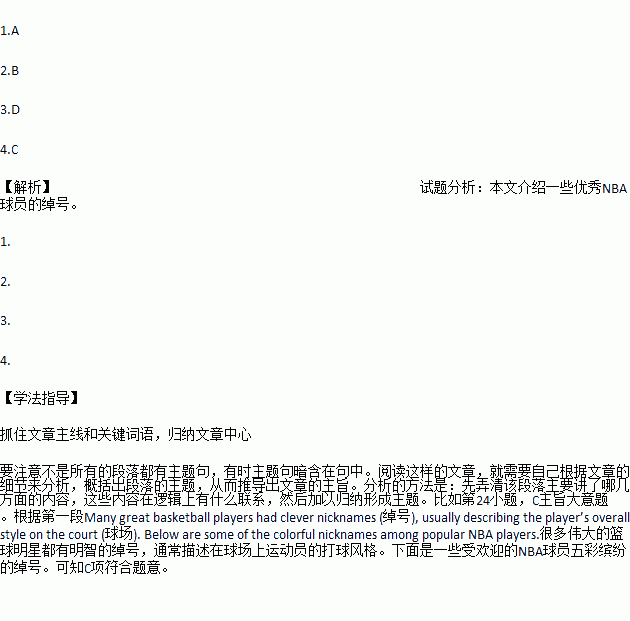题目内容
Many great basketball players had clever nicknames (绰号), usually describing the player’s overall style on the court (球场). Below are some of the colorful nicknames among popular NBA players.
“Tiny”
Nate Archibald, at six feet one inch tall, was small for a basketball player. Still, Archibald used speed and his brains to control the court in the 14 seasons that he played in the NBA. Interestingly, his nickname originated off the court: he was named after his father, “Big Tiny”.
“Magic”
Earvin Johnson was called “Magic” by a sportswriter who saw him playing basketball in one high school game. Johnson was a skillful player, often doing the unexpected, to the chagrin of his competitors and the delight of the audience. He also won a gold medal as part of the U.S. “Dream Team” in the 1992 Summer Olympics in Barcelona, Spain.
“The Mailman”
Karl Malone earned his nickname because on the court he delivered consistently. Malone spent most of his career with the Utah Jazz, gaining a reputation as one of the best power forwards of all time. He also won two Olympic gold medals, as part of the U.S. “Dream Team” in the 1992 Summer Olympics in Barcelona, Spain and in the 1996 Summer Olympics in Atlanta, Georgia.
“The Iceman”
George Gervin made the most difficult shots look easy. He was also famous for keeping his cool in every game, playing in a relaxed way under pressure. Gervin, who played most of his 14 years in the NBA with the San Antonio Spurs, was unequalled in many ways as a shooting guard.
1.Whose nickname has nothing to do with basketball?
A. Nate Archibald’s B. Earvin Johnson’s.
C. Karl Malone’s. D. George Gervin’s.
2.The underlined word “chagrin” in Paragraph 3 probably means “_____”.
A. amazement B. impatience
C. enthusiasm D. annoyance
3.Why was George Gervin called “The Iceman”?
A. He was always as cold as ice.
B. He had a glass of iced beer every day.
C. He was always able to keep calm on the court.
D. He didn’t get along well with his teammates.
4.The author’s purpose in writing the text is to _____.
A. uncover the secrets of NBA players’ success
B. talk about how to give others a lovely nickname
C. show how to become an excellent basketball player
D. introduce some NBA players and their nicknames

